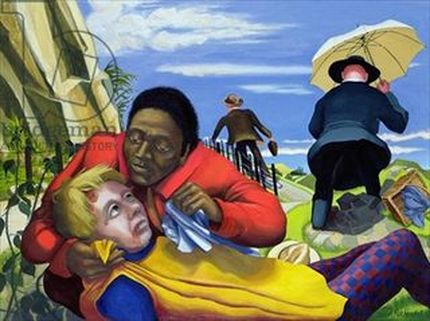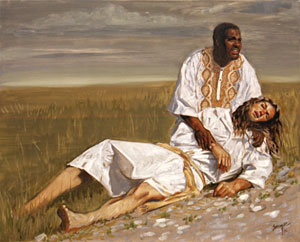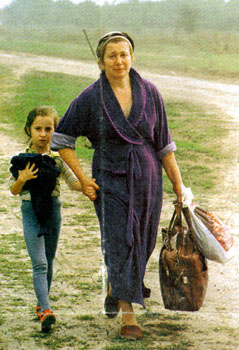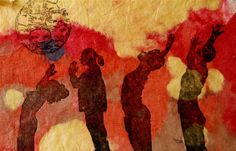
"The Good Samaritan"
The inflatable boat overloaded with Syrian refugees neared the rocky Greek island coastline shortly after dawn last week; the smuggler revved the motor and hurtled forward. There was panic among the people on board, who shouted to slow down. Instead the boat hit the rocks and flipped over, throwing 14 adults and five children into the sea.
Derar Alzarzor grabbed his terrified sons aged one and three. He knew neither could swim – just like Aylan and Galip Kurdi, the Syrian brothers whose drowning in September provoked a global outcry. But ten-year-old Moaje Saad was less fortunate, trapped beneath the overturned boat for several minutes. ‘Everything was black,’ she said. ‘I was crying and thinking bad things would happen.’
Such incidents unfortunately happen every week, to date, 2,600 innocent lives have been lost fleeing the terror of fighting, seeking a better life. Not to belittle what happened in Paris by any means, where 128 innocent people were killed by terrorism on November 13 – but a case can be made, perhaps ought to be explored, that we have seen on the Mediterranean Seas a case of about 20 Paris’-- a case of ruthless smugglers, preying on desperate people fleeing from tyranny and war, and the outcry simply is not there. Instead what we have seen is the opposite. Nevertheless, the U.S. House of Representatives, believing terrorists are planted among refugees, voted overwhelmingly Thursday to make it more difficult for Syrian and Iraqi refugees to come to America.
In addition, more than half of the US’s governors have said they will no longer provide placement for Syrian refugees, arguing that they pose too great a risk to national security.
Opponents reminded us: "We face a choice that will echo through history," (Rep. Jerrold Nadler, D-N.Y.,) who pointed out to lawmakers that the U.S. turned away Jewish refugees fleeing Nazi Germany in 1939. "We must not let ourselves be guided by irrational fear." The White House said that 2,174 Syrian refugees have been admitted to the United States since Sept. 11, 2001, and "not a single one has been arrested or deported on terrorism-related grounds."
It is ironic that we are having such debates the week before we gather to celebrate the great American holiday of Thanksgiving. The story of Thanksgiving forever has imprinted in our minds happy pilgrims and Indians for a cooperative feast in 1621 after a bountiful harvest that came after a nearly devastating time when the settlement lost more than half their members to illness and exposure. Sadly such cooperation, from the settlers end, would not last.
Proclamations of days of Thanksgiving were common in our early history, as were calls to fast and repent. George Washington called for a Day of Thanksgiving for gratitude for the nation’s successful winning the War of Independence. Abraham Lincoln in 1863, at the height of the Civil War, in a proclamation entreating all Americans to ask God to “commend to his tender care all those who have become widows, orphans, mourners or sufferers in the lamentable civil strife” and to “heal the wounds of the nation.” He scheduled Thanksgiving for the final Thursday in November, and it was celebrated on that day every year until 1939, on the eve of war and Depression, when Franklin D. Roosevelt moved the holiday up a week in an attempt to spur retail sales. Roosevelt’s plan, known derisively as Franksgiving, was met with such opposition, that in 1941 the president signed a bill making Thanksgiving the fourth Thursday in November.
So we talk about national turmoil in the roots of Thanksgiving. Turn on the radio and we hear heartwarming stories about families gathering, communities sharing, people caring. Isn’t that what it’s all about. Except we are in the danger of losing a significant component of the true nature of Thanksgiving. Giving thanks, reaching out and caring not only when it is easy, but when it is inconvenient, dangerous and hard.
Our gospel lesson is one of the most well-known stories of the gospel-- we famously call it “the good Samaritan.” Hospitals and Inns and churches all around the world have been proud to be named after this anonymous man. Jesus is posed a hypothetical question by a lawyer or a expert of the law, “who is my neighbor?” in response to Jesus’ statement, ”love your neighbor as yourself.” Jesus describes a man, supposedly a regular Jew, taking an ordinary trip to Jericho, but falls in to a gang of robbers who beats him into an inch of his life.
A priest and a Levite, see him and following religious law that presume he is dead or defiled, pass on the other side. Or, perhaps, the robbers are still lurking by waiting for another victim. Best to hurry on. They care more for their religious purity and safety than for the injured man. It is a Samaritan man, a foreigner who is despised and looked down upon by Jews who takes the time, with no regard to his own being, to come near. The Samaritan when he saw the man is filled with pity, or compassion. The vast occurrences of the word “compassion” in the gospels are connected to Jesus or his teachings, like here to illustrate the actions of a compassionate person.
Now this is what a compassionate person does. He goes to the wounded person. He bandages his wounds, first pouring oil and wine to disinfect them. He places the injured man on his own animal, meaning that he will walk the rest of the distance to Jericho. He takes him to an Inn to care for him. Before he leaves, he gives the innkeeper two denarii, two days’ wage and says, “take care of him, and when I come back I will repay you whatever you spend.” Imagine that. We don’t even know if these two have talked. If the Samaritan doesn’t even know the injured man’s name. Yet the Samaritan assumes responsibility to make him well. The lawyer concedes the Samaritan acted as a neighbor to the injured man because he showed mercy—a Godly strait.
It is easy to be good, to be a Christian, to be a neighbor, to celebrate Thanksgiving, when times are going well, we are surrounded by friends and the future is bright and the sun is figuratively shining. How do we celebrate Thanksgiving with a refugee sting of Paris and Beirut still near, the refugee crisis growing deeper, ISIL becoming more belligerent and our response to a hurting world is increasingly to walk to the other side. Who will stop and see? Who will bandage and pour oil and wine on the wounds? Who will carry the victims? Who will find the Inn? Who will pay the price? Whatever it takes? Who will show mercy? Who is willing to celebrate true Thanksgiving – because this is what we were shown.
Who among us hasn’t been beaten or violated or hurt in body, mind or spirit? Has anyone here been thrown aside on the road? Left to die – oh, maybe not physically but emotionally, mentally or spiritually? Who here has felt the sting of being ignored by the powers that be – as they crossed over to the other side of the street , so that they didn’t have walk near your kind, catch your cooties?
The truth is, we’ve all been dealt a blow and if someone had not shown us compassion we wouldn’t be where we are today. Someone Poured on us the wine of compassion and mercy, someone did not look away. Someone paid attention. Someone carried us when we were too weak to walk. Someone bandaged our wounds. Someone got us help, and fronted the money, and said do whatever it takes. That kind of compassion and caring is basic – Jesus. If we didn’t get it from a friend, a loved one a family member, from a stranger, than we got it from Jesus, somewhere, somehow, because we are here today. Maybe, maybe, we are here, to get it today, because we are worth it, and it is our duty, to get out there, and turn Thanksgiving around.
In the midst of the adversity and danger of ISIL we still must help the refugees. We must. It is our Christian calling. The good Samaritan stopped when the Priest and Levite wouldn’t in spite of fear. He didn’t cross over to the other side.
We must turn Thanksgiving around. Yet all Thanksgivings historically were called after and in times of trial and tribulation, not gloating and prosperity. I’m not saying we shouldn’t give thanks for good times. However, we as a nation are getting used to our good times without taking a compassionate view of the larger picture. We are members of a larger family—many of whom are suffering this week – without food or shelter. Is there nothing for them? We must have a heart like 7 year old Jack Swanson in Texas who gave his piggy bank to a mosque that was vandalized recently. Or like Toronto newlyweds Samantha Jackson and Farzin Yousefian, who donated their reception money to resettle Syrian refugees. Or like Highland Presbyterian Church in Kentucky, with the assistance of Kentucky Refugee Ministries, who opened their doors last August to a Syrian family who were homeless and fleeing for two years.
Remember the compassion that someone, that Jesus has had for us. Let it break open our hearts so that we can see. So we stop.
I challenge our congregation to stop and see the wounded laying at the roadside. And not cross over.
I challenge our congregation to have compassion.
I challenge our congregation to bind up the wounds, to pour out the wine and oil of care and concern.
I challenge our congregation to pick up the wounded refugee and get the m to safety.
I challenge our congregation to get the wounded refugee to a safe place, to help pay the price, to join with other agencies, to settle the cost. To make a difference. Yes. I challenge us. Because Jesus says Love our neighbor. Jesus says, show mercy. In a world that is filling up with fear and bravado, we must show what Thanks-giving is truly about.
Mercy. Compassion and love. All about what Jesus taught us.
Remember as Jesus said, Go, and do the same.
That’s how we turn Thanksgiving around.
Go, and do the same.
If we do this, we will never again be the same.
Amen.
http://www.dailymail.co.uk/debate/article-3223683/Amid-tears-tragedy-British-Good-Samaritan-IAN-BIRRELL.html
http://www.usatoday.com/story/news/2015/11/19/house-passes-bill-bar-syrian-refugees-us-without-more-vetting/76041668/
http://www.history.com/topics/thanksgiving/history-of-thanksgiving



 RSS Feed
RSS Feed